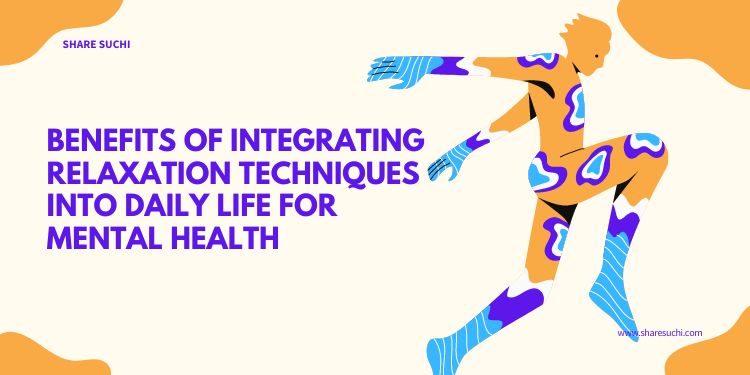In this article, we will be learning the benefits of integrating relaxation techniques into daily life for mental health.
In our fast-paced, constantly connected world, stress has become an almost unavoidable part of daily life. Work pressures, personal responsibilities, and the never-ending stream of information from digital devices all contribute to increasing levels of anxiety and mental fatigue.
However, by integrating relaxation techniques into your daily routine, you can effectively manage stress, improve mental health, and enhance overall well-being.
Table of Contents
Here’s Benefits of Integrating Relaxation Techniques into Daily Life for Mental Health
Relaxation Techniques
Relaxation techniques are methods, practices, and exercises designed to reduce tension in the body and calm the mind. These techniques can range from simple deep-breathing exercises to more structured practices like meditation, yoga, and progressive muscle relaxation.
While each technique has its own unique approach, the common goal is to shift the body from a state of stress to one of relaxation, promoting mental clarity, emotional balance, and physical health.
The Mental Health Benefits of Relaxation Techniques
- Reduction in Anxiety and Stress Stress is a natural response to challenging situations, but chronic stress can lead to anxiety disorders, depression, and other mental health issues. Incorporating relaxation techniques into your daily routine helps to reduce the production of stress hormones like cortisol, leading to a calmer state of mind. Regular practice can lower anxiety levels and provide a buffer against the stressors of everyday life.
- Improved Sleep Quality Poor sleep is both a symptom and a contributor to mental health problems. Relaxation techniques, particularly those practiced before bedtime, can help you unwind, making it easier to fall asleep and stay asleep. Techniques like deep breathing, guided imagery, and progressive muscle relaxation are particularly effective in reducing insomnia and improving the quality of sleep, which is essential for mental health.
- Enhanced Emotional Resilience Life is full of ups and downs, and emotional resilience is key to navigating these fluctuations. Regular relaxation practices can help you build resilience by training your mind to remain calm and composed in stressful situations. Over time, you may find that you react to challenges with a clearer, more balanced mindset, reducing the emotional rollercoaster that often accompanies stress.
- Increased Mindfulness and Self-Awareness Many relaxation techniques, such as mindfulness meditation, encourage you to focus on the present moment, cultivating a sense of awareness and acceptance of your thoughts and feelings. This increased mindfulness can lead to better self-awareness, allowing you to recognize negative thought patterns and emotions before they escalate. By fostering a more mindful approach to life, you can improve your overall mental health and well-being.
- Boosted Mood and Happiness Regularly practicing relaxation techniques can lead to a significant improvement in mood. The reduction in stress and anxiety, coupled with the increase in mindfulness and emotional resilience, naturally leads to a more positive outlook on life. Additionally, relaxation techniques can trigger the release of endorphins, the body’s natural “feel-good” hormones, further enhancing mood and promoting a sense of happiness and contentment.
- Enhanced Cognitive Function Stress and anxiety can cloud your thinking, making it difficult to focus, make decisions, and solve problems. By reducing stress, relaxation techniques can improve cognitive function, enhancing your ability to think clearly and creatively. This is particularly important in today’s fast-paced world, where mental agility and clarity are essential for both personal and professional success.
How to Integrate Relaxation Techniques into Your Daily Routine
Integrating relaxation techniques into your daily life doesn’t require a major time commitment. Here are some simple ways to get started:
- Morning Meditation: Begin your day with a few minutes of mindfulness meditation to set a calm and focused tone for the day ahead.
- Deep Breathing Breaks: Take short breaks throughout the day to practice deep breathing exercises. This can help reset your stress levels and maintain a sense of calm.
- Yoga or Stretching: Incorporate a short yoga or stretching routine into your morning or evening to release physical tension and promote relaxation.
- Progressive Muscle Relaxation: Before bed, practice progressive muscle relaxation to help your body and mind unwind, paving the way for restful sleep.
- Mindful Moments: Throughout the day, take a few moments to pause, breathe, and fully engage with your surroundings. This can be as simple as appreciating the taste of your food or the feeling of the sun on your skin.
Conclusion
Incorporating relaxation techniques into your daily life is a simple yet powerful way to improve your mental health and overall well-being. By regularly practicing these techniques, you can reduce stress, enhance emotional resilience, improve sleep, and boost your mood.
The key is consistency; even a few minutes a day can make a significant difference. In a world that often feels overwhelming, making relaxation a priority is an investment in your mental and emotional health that pays long-term dividends.
FAQs
How long should I practice relaxation techniques each day to see benefits?
The ideal duration can vary depending on the technique and your personal preferences. Generally, practicing relaxation techniques for just 5-10 minutes a day can lead to noticeable benefits. Consistency is key; even short daily sessions can help reduce stress and improve mental health over time.
Can relaxation techniques be combined with other mental health treatments?
Yes, relaxation techniques can complement other mental health treatments like therapy and medication. They are often used alongside traditional treatments to enhance overall effectiveness, reduce stress, and improve emotional resilience. Always consult with a healthcare provider to tailor an approach that best suits your individual needs.
What are some relaxation techniques that can be done quickly during a busy workday?
For a quick stress relief during a busy workday, consider techniques like deep breathing exercises, progressive muscle relaxation, or short mindfulness meditation. These can be performed in just a few minutes and can help clear your mind and reduce tension even in a hectic environment.
Are there specific relaxation techniques that are more effective for improving sleep quality?
Techniques such as guided imagery, progressive muscle relaxation, and deep breathing exercises are particularly effective for improving sleep quality. Practicing these techniques before bedtime can help calm your mind and prepare your body for restful sleep. Creating a consistent pre-sleep routine with these techniques can enhance their effectiveness.
How can I stay motivated to regularly practice relaxation techniques?
Staying motivated can be challenging, but setting small, achievable goals and tracking your progress can help. Consider integrating relaxation techniques into a daily routine by associating them with other habits, like morning coffee or evening wind-down time. Additionally, finding a technique that you genuinely enjoy and noticing the positive effects on your mood and stress levels can also boost motivation.


